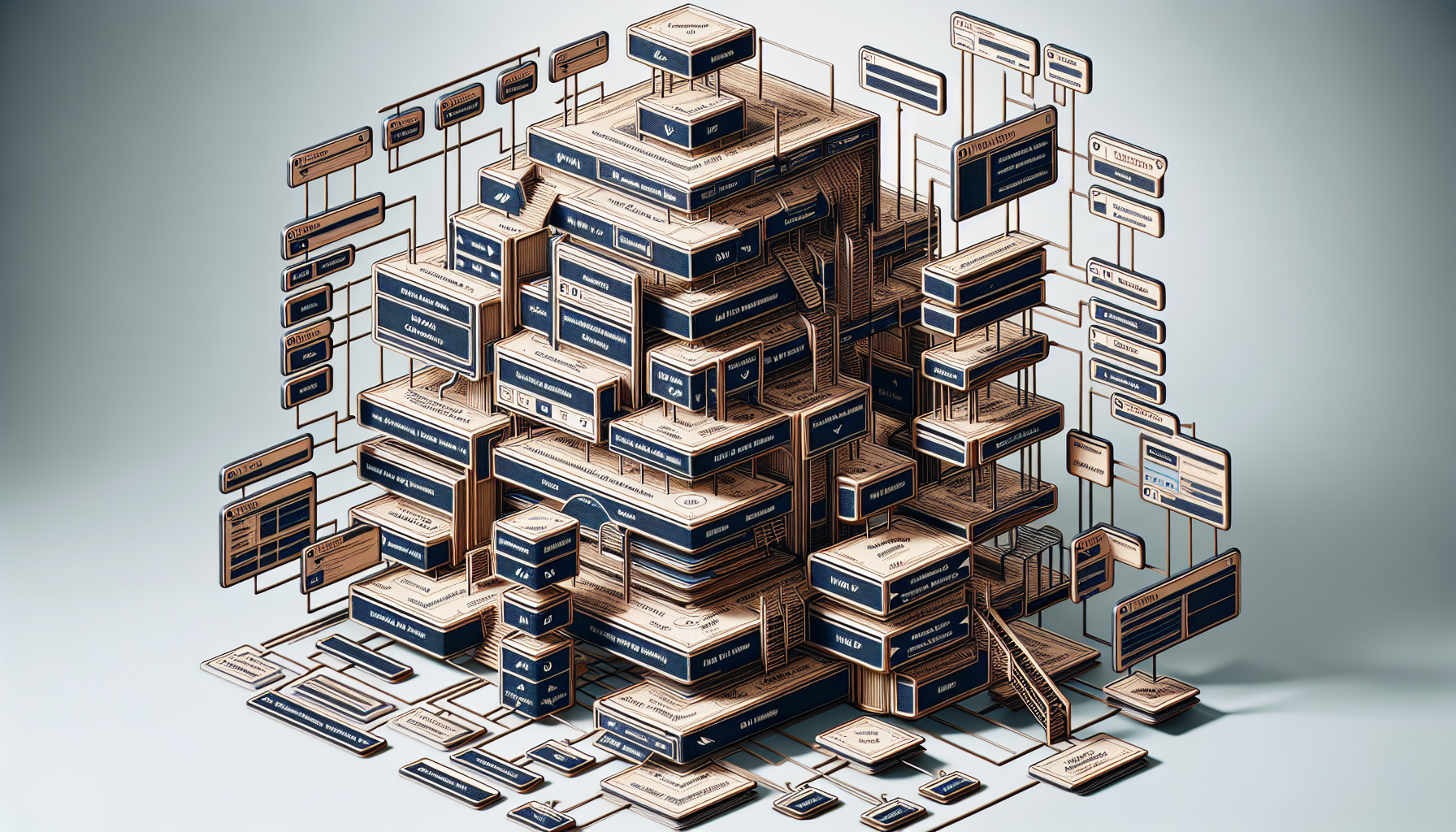In today's fast-paced digital age, every industry, including the construction business, requires a robust online presence. A well-designed website plays a critical role in showcasing your projects, skills, and services to potential clients. Today, we will delve into the essentials and best practices for construction website design, a burgeoning area of the digital landscape.
Design of a Construction Website: Why it Matters
A construction website is more than a digital business card. It is a crucial component of your marketing strategy and a platform to:
- Showcase your work portfolio
- Connect with prospective clients
- Provide detailed information about your services
- Increase visibility and brand awareness
- Enhance credibility and trustworthiness
The digital world is the first place potential clients look for construction services. Hence, investing in a user-friendly, SEO-optimized, and aesthetically appealing website is essential for success in this industry.
Key Elements of an Effective Construction Website Design
Your construction website can be the bridge between your business and new customers, but it needs to have the following key elements:
- Professional Design: Aesthetics matter; a well-designed, professional-looking website can instill confidence in prospective customers.
- Optimized Navigation: Users should be able to easily navigate your website and obtain the information they need.
- Quality Content: From images of completed projects to detailed service descriptions, the content should be informative, engaging, and SEO friendly.
- Responsive Design: With many users accessing websites on mobile devices, having a responsive design is crucial.
- Call to Action: Clear, compelling calls to action can guide visitors to make contact or schedule a meeting.
- Optimization for Local SEO: This allows your website to appear in local search results, making it easier for clients to find your business.
Designing a Construction Website: The Best Practices
- Showcasing Your Work: Your website should showcase high-quality, professional photos of your completed projects. Create a dedicated portfolio page to feature them.
- Highlighting Testimonials: Positive reviews and client testimonials build trust, so don’t underestimate their importance.
- Optimizing for Mobile devices: More people are browsing online using smartphones or tablets. Therefore, ensuring your site is mobile-friendly is a necessity.
- Blog Posts & News: Regularly update your website with new content. This not only helps with SEO efforts but also showcases your industry expertise.
- Localized SEO: Use geographically-specific keywords in your content and meta tags to rank better for local searches, attracting nearby clients.
Role of SEO in Construction Website Design
Search Engine Optimization (SEO) is an effective way to enhance your online presence and reach more customers. Effective SEO practices for a construction website include:
- Using construction-related keywords in titles, content, and meta descriptions
- Optimizing website loading speed
- Creating quality backlinks to your website
- Improving website navigability and responsiveness
Importance of Usability in Construction Website Design
Incorporating usability during the design process helps create an intuitive, user-friendly website. Key usability considerations should include:
- Streamlined navigation with logical, easy to find information
- Clear and actionable calls to action
- User-friendly forms for contact or quote requests
- Easily readable fonts and colors
Frequently Asked Questions about Construction Website Design
Why is a Professional Appearance Important in a Construction Website Design?
Properties, buildings, and structures are all huge investments for clients. When they visit a construction website that looks professional, tidy, and solid, it builds trust and confidence in your ability as a construction company. They will feel that their investment is safe with you.
How Can a Construction Website Design Reflect my Brand?
Your Construction Website Design can incorporate your company's color scheme, logo, and other branding elements consistently throughout the site. This will help visitors associate your site with your brand, thereby increasing your brand recognition.
Why Should a Construction Website Design Be User-Friendly?
In this digital age, user experience is key. Your visitors should be able to navigate your site easily, find the information they need swiftly, and interact with your site effectively. This will not only enhance their site visit experience but also increase the chances of them reaching out to you for their construction needs.
What Role Does SEO Play in a Construction Website Design?
Search Engine Optimization (SEO) plays a big role in any website, including construction websites. A well-optimized site will rank higher on search engine results, increasing your visibility to potential clients. This involves using relevant keywords in your content, having a mobile-friendly design, fast loading speeds, and more.
What Information Should Be Included in a Construction Website Design?
Your construction website should provide all relevant information that potential clients may need. This includes your company’s background, services offered, past projects, reviews, contact information, and more. The information should be accurately and clearly presented in an organized manner.
Can I Include a Blog in My Construction Website Design?
Absolutely! Blogging can be an excellent way to provide valuable information and insights to your visitors about the construction industry. It can also help to boost your site's SEO, positioning your website as an authoritative source in the construction sector.
What Is the Importance of Mobile-Friendly Construction Website Design?
A significant percentage of internet users access the web using their mobile devices. A mobile-friendly design ensures that your visitors can view and navigate your site effectively, regardless of the device they are using. Not only does this enhance user experience, but it also positively affects your site’s search engine ranking.
Pros of Construction Website Design
Easy Accessibility
Construction website design ensures that important company information is centrally located and easy for visitors to find. It provides a platform where clients can access information about a construction company, check the services they offer, see their previous projects, read testimonials from other clients, and reach out for more information or to start a project.
24/7 Availability
In contrast to physical construction companies that typically stick to standard business hours, a construction website is accessible to potential clients round-the-clock. This allows businesses to cater to clients in different time zones and answer queries at any time.
Enhanced Credibility
Having a professional and well-organized construction website can considerably enhance a company's credibility. It allows them to display their expertise, past projects, and testimonials helping build trust and confidence among potential clients or customers.
Showcasing Work Portfolio
A well-designed website is instrumental in showcasing a portfolio of past projects. This is a great way to visually demonstrate the capabilities of a construction company — encouraging potential clients to explore what the company can do for them.
Increased Visibility
A well-optimized construction website will significantly improve the company's visibility by making it easier for potential customers to find them. Good SEO practices can help businesses appear on important search result pages, making it easier for your target audience to find you.
Cost-Effective Marketing
Construction websites provide a cost-effective platform for marketing the company's services. Compared to traditional forms of marketing, maintaining a website requires less budget and can reach a wide range of audiences.
Cons of Construction Website Design
Requires Regular Updation
A website reflects the face of a company. Hence, it requires continuous updation in terms of content, design, and technology to stay current and relevant. If not updated regularly, websites can become outdated and poorly reflect a company's brand.
Increased Responsibility
Having a website means increased responsibility for monitoring uptime, handling user queries, troubleshooting, and resolving any technical issues that may arise. Construction companies may need to hire extra staff or outsource these tasks.
Costs
While a construction website is relatively cheaper than the traditional market, it still requires some budget allocation. These expenses included website design, domain name registration, hosting expenses, and periodically updating the website.
Targeting Local Audience Could Be Challenging
While having a website can provide global exposure, it may not be effective in targeting the local audience. To reach local customers, businesses might still need to depend on traditional marketing methods.
Credibility Can Be Affected by Negative Reviews
As much as a website can enhance credibility, it can also be a double-edged sword. If the website houses negative reviews from customers, it might detrimentally affect the company's reputation.
Cybersecurity Threats
Websites are vulnerable to cyber threats and require adequate protection to maintain privacy and integrity. This can add to the costs and require a company to regularly update its security measures.
Technical Skills Required
Designing and maintaining a website requires some technical skills. There will be a learning curve involved for those unfamiliar with website design, SEO practices, or content creation. Training or hiring a skilled individual may be necessary.
Potential Website Downtimes
Website downtimes can have a negative impact on a company's operations. This can lead to potential losses and tarnish their professional reputation as it may seem like the company is unreliable.
To sum it up, having a construction website has its fair share of pros and cons. It's an excellent asset for demonstrating expertise, reaching wider markets, and offering clients a convenient way to reach out. But, it also comes with added responsibilities, which must be managed efficiently and systematically for smooth operations.
Summary
In the world of digital marketing, construction website design has a vital role to play. It's the online face of your company and the first point of interaction for most potential clients. An impressive and well-designed website can easily win you more business, while a poor one can turn clients away. An effective construction website design showcases your company's work, professionalism, and credibility while meeting your customers' needs.
When it comes to construction website design, there are a few essentials. Clear, easy navigation and a clean, modern look are important. The website should also be mobile-friendly since a significant amount of web traffic comes from mobile devices. Interesting content, customer testimonials, and a compelling call to action can make your site stand apart from the competitors. Smart design features can turn your site into a valuable business tool that not only informs about your services but also generates leads and converts them into actual clients.
Lastly, it’s important to remember that good construction website design is an ongoing process. The digital world is constantly evolving, and so are customer needs and expectations. Therefore, continual updates and improvements are key to staying ahead of the competition. A proactive approach to optimizing website design can ensure that your construction business keeps thriving in the digital marketplace.
About WebPerfex
WebPerfex is a dynamic, Sacramento-based digital marketing and SEO firm passionately dedicated to helping businesses across the California region grow their online presence. Born and bred in the beautiful city of Sacramento, CA, we are a squad of creative geniuses, SEO gurus, and marketing masterminds who live and breathe all things digital. We're all about combining our deep understanding of local context, technical expertise, and innovative strategies to drive your business growth. Whether you're a startup looking to launch your digital ride or an established brand ready to skyrocket to the next level, we're right there with you. After all, your success is our favorite project!




